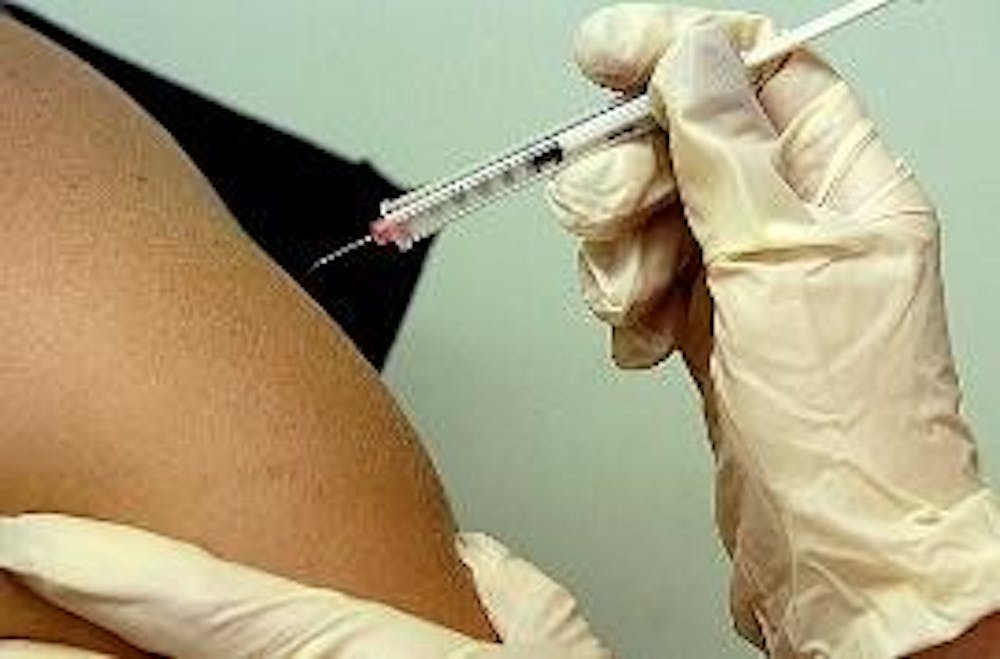In this two part series, The Eagle examines two exclusions in student health care - the HPV vaccine and transgender health treatments - and the many ways students are fighting to get those benefits covered.
To the almost 1,100 AU undergraduates who subscribe to university health insurance, the Student Health Center's announcement earlier this summer that it was changing health care providers probably seemed routine.
In its first formal bid for an insurance policy in nearly four years, the university selected GM Southwest, a Blue Cross company - and with it, a package that almost exactly resembled last year's Chickering program.
"We wanted the best financial arrangement with the broadest choice of network providers," said Dan Bruey, the Student Health Center's director. "Chickering was great ... but the best this year was GM Southwest."
But while the premium barely increased and the doctor options greatly expanded, two of students' most apparent criticisms of the Chickering plan remain unaddressed. The new GM Southwest plan still does not cover the HPV vaccine and it excludes transgender students from pursuing gender identity and hormonal care.
Apart from those two issues, the benefits students enjoyed under Chickering - recently renamed Aetna StudentHealth - still apply. GM Southwest's policy covers the same ratio of each covered medical treatment provided at the Student Health Center. The only financial difference is the annual premium, which jumped this year from $1,250 to $1,325 per student. However, the price of insurance usually increases every year - GM Southwest offered AU the smallest increase - because of changes in the cost of living, Bruey said.
Also different is the university's mental health care policy. Previously, students who wished for external psychological care had to meet with the Counseling Center to seek a referral. Under GM Southwest, however, students no longer need that "piece of paper" and may choose a care specialist from the list of GM Southwest's in-network doctors, Bruey said.
"It affects everyone"
Ask Women's Initiative Director Ashley Evans what she dislikes most about the new student health insurance plan, and she's quick to reply: "No HPV coverage."
Although Gardasil - the HPV vaccine's more common shelf name - first received approval from the Food and Drug Administration in 2006, it has yet to appear in any of AU's student health insurance plans, Evans explained.
"But AU's decision to switch carriers this summer would've been a great opportunity to get the HPV vaccine covered," she said.
Although AU student leaders and health administrators have long discussed the process of covering Gardasil, the university has not made its inclusion a priority - under either Chickering or GM Southwest's watch - because of a series of important financial, logistical and medical concerns, Bruey said.
The problem the university has every year with Gardasil is its price tag. Upon surveying available student insurance carriers in 2008, the Student Health Center concluded that the HPV vaccine would cost policy-holding students an extra $40 to $75 a year, Bruey said.
The carriers that offered HPV at the lowest price also promised the steepest increase in student fees elsewhere, he said. In other words, even if the university chose one of the cheaper, HPV-inclusive plans, the price alone would have forced the health center to sacrifice other benefits or risk a significant increase in the annual premium, he said.
But most crucial was the question of fairness: The greatest burden to front the premium increase would have fallen on male students' shoulders, Bruey said. In traditional health insurance, all policy members' monthly premiums comprise a gigantic "risk pool" that pays for individual treatments, including visits to the doctor and the full cost of medicines, so covering HPV would have required men to pay for a vaccine they could not have, Bruey said.
"Since some women have experienced bad reactions to the vaccine ... and it isn't yet available to men, we didn't want to put a cost onto all enrollees if it wasn't also available to all enrollees," Bruey said.
He noted that the university would reconsider the vaccine when the male variant became available.
But that is insufficient reasoning to forgo HPV coverage in this year's policy, Evans said. Thousands of women per year contract the disease, long considered to be a major cause of cervical cancer, she added.
"HPV is a burden that affects everyone," Evans said. "It's male students' sisters, grandmothers and mothers who might encounter HPV, [and the vaccine] is one of the ways men can help prevent it."
As for evidence of the vaccine's safety, the Centers for Disease Control's Web site reports previous studies showed "no serious side effects in women." Although some women did faint after the injection, the most common complaint following the vaccination was pain around the injection site, the CDC reported.
In future insurance plans, the university hopes to address HPV vaccine coverage, Bruey said. But including it might come at a price: It's difficult to subtract a benefit once it's been added, so whereas students today might pay $40 to $75 a year more with Gardasil in their policy, taking it out in later years would not necessarily yield an equal decrease in premium costs, he said. As more female students enter AU already having received the vaccine, the university does not want to procure a benefit it does not need, Bruey said.
There are options, however, for female students currently on the health insurance plan who wish to receive the vaccination. Merck, the drug company that created Gardasil, often waives the almost $400 fee for women who demonstrate exceptional financial need. Although students must apply for the waiver prior to receiving each of Gardasil's three mandatory injections, some relief is better than nothing, Evans said.
Next week, The Eagle will examine transgender exclusion in student health care.
You can reach this staff writer at tromm@theeagleonline.com.





